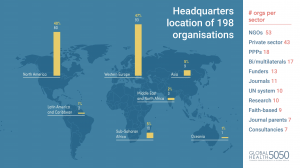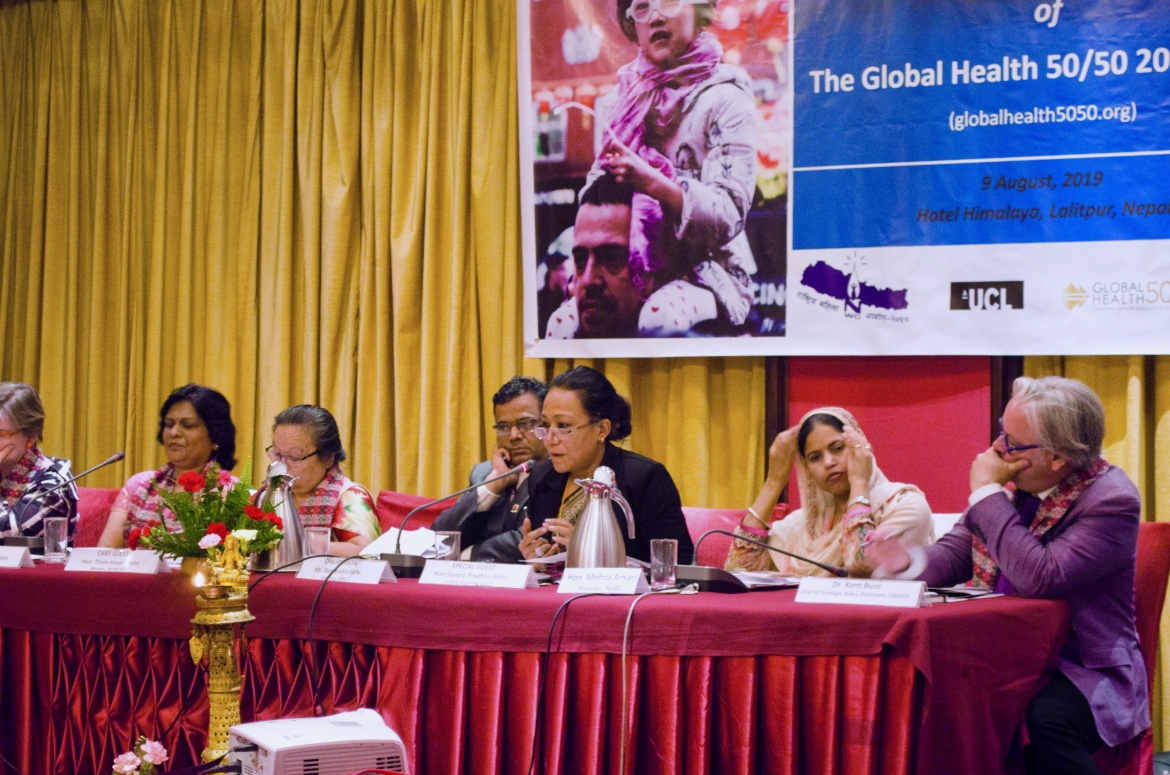Translating the GH5050 Report into results for people: Reflections from Kathmandu
On August 9th, global health and development leaders and practitioners gathered in Kathmandu, Nepal for a national dissemination of Equality Works, the Global Health 50/50 2019 Report. Co-hosted by the National Women Commission and the Center for Research on Environment Health and Population Activities (CREHPA) and convened by Dr Mahesh Puri, Associate Director of CREHPA, the event fostered a dialogue on the challenges and opportunities for progress for gender equality in Nepal and how the GH5050 report can be used to catalyse change.
Mr Deependra Kafle, the Secretary of the National Women’s Commission, opened the event. High-level speakers also included Special Guest Hon. Sapana Pradhan Malla, Judge Supreme Court, Chief Guest Hon. Tham Maya Thapa, Minister, Women Children and Senior Citizen (MoWCSC) and Dr. Pushpa Chaudhary, Secretary, Ministry of Health and Population.
Global Health 50/50 Co-Directors Professor Sarah Hawkes, Professor of Global Public Health at University College, and Dr Kent Buse, a political economist who serves as Chief of Strategic Policy Directions at UNAIDS, Geneva, presented the findings of the 2019 report.
The report, which reviews the gender-related policies and practices of 198 organisations active in global health, provides an in-depth look at the issue of gender inequality in the workplace. In 2019, the Report found that 7 out of 10 executive leaders and board chairs are men, and among senior management, less than 1 in 3 organisations have achieved gender parity, while for boards the parity figure drops to 1 in 4. Further, organisations are generally failing to provide transparent, comprehensive policies on sexual harassment, parental leave and family friendly workplaces: 2 in 3 organisations for example did not have a publicly available sexual harassment policy, and of those that did, the majority did not meet GH5050 criteria of a comprehensive policy.
During the discussion segment, panellists reflected on the relevance of these findings in Nepal, where, despite important achievements to institutionalize women’s rights and promote the social, economic and political empowerment of women, challenges to gender equality remain. In Nepal, as around the world, women and girls are often furthest left behind. They constitute the bulk of informal sector workers lacking social protection and access to essential health services.
“Policies do not automatically translate to action or change” said Ms Rudra Devi Sharma, Joint Secretary of the MoWSCS. “For instance, the Government of Nepal has a Sexual Harassment Workplace Act to prevent and address sexual harassment in the workplace, but we find that individuals are often unwilling to recognise sexual harassment or report it when it does occur. Alongside policies and words on paper, we must work to ensure their implementation to ensure we have safe workplaces for all.”
Across the board, panellists and special guests spoke of the need to bridge the gap between policies on paper and achieving meaningful change through their implementation. Promising strategies were highlighted, including collective bargaining, pushing for broader social transformations, challenging mindsets, engaging with rights discourse and relying on rigorous local data.
Dissemination events like this one offer a chance to explore the relevance of the report findings at national level, but also to discuss the gaps that exist between organisational headquarters, where policies are largely conceptualised and written, and country offices. In 2019, 87% of global health organisations – defined by GH5050 as organisations playing an active role in health and with operations in at least three countries – were headquartered in either North America or Western Europe. Global health governance, as a result, remains dominated by the global north. Panellists emphasised the need for an analysis similar to the GH5050 2019 Report of the gender-related policies and programmes of health actors in Nepal – reviewing both the country operations of global actors and domestic institutions to gain better data at the national level.

From Equality Works: The Global Health 50/50 2019 Report. Headquarters location of 198 organisations active in global health, 2019.
GH5050 aims to be a catalyst for change by providing a review of organisational performance and holding up a mirror to the global health sector. Organisations are encouraged to embrace the findings of the 2019 Report, and through bold leadership and collective action, translate growing commitment to gender equality into meaningful progress towards more equitable, respectful workplaces that work for everyone. Conversations such as these that allow for frank, informed dialogue with influential voices from different sectors of society are vital to uncovering challenges, defining solutions and building momentum for change.
Quotes from the event
“To address gender inequality and other forms of discrimination, the law matters. With laws, citizens can demand something and create accountability. But laws alone are not enough; to bridge the gap between laws and everyday practice, institutions matter, partnerships matter, private sector accountability matters and mindsets matter. We must work in all these areas to achieve gender equality.” Hon. Sapana Pradhan Malla, Judge Supreme Court
“As vice-person of CEDAW, I am familiar with the importance of finding information based on solid evidence for positive change. The Global Health 50/50 Report provides an invaluable independent review to advance gender equality in health, and I look forward to seeing how it can build on and align with monitoring mechanisms like CEDAW to create real, on the ground change for gender equality across the globe.” Ms. Bandana Rana, Vice-chairperson at the United Nations Committee on the Elimination of Discrimination against Women
“The GH5050 Report recognises the success of the UN sector, but more importantly highlights certain gaps. While UNFPA is scored highly at a global level, attention must also be paid to organisational performance at the national level. In Nepal, a recent gender audit of UN agencies enabled us to identify key, context-specific issues holding women back in the workplace. Replicating the GH5050 review at national level would enable similar reviews in other sectors and contexts.” Ms. Lubna Baqi, Country Representative UNFPA
“Health is often considered one of the most progressive sectors. But this important report from GH5050 highlights just how much still needs to be done in the sector. Discussions today have highlighted the gap between having mechanisms and policies in place and their successful implementation. When it comes to issues such as sexual harassment, women’s collective bargaining can help ensure that policies, reporting mechanisms and sanctions are fully implemented by holding organisations and leadership to account.” Mr. Sabin Shrestha, Executive Director, Forum for Women Law and Development
“We are trying to transform a man-made society. The health sector cannot be seen in isolation from that society which it is both part of and reflects. GH5050 pushes us towards more gender-equitable workplaces, and we must work collectively to achieve gender-parity both within the workplace and in society more broadly.” Dr. Pushpa Chaudhary, Secretary, Ministry of Health and Population
“Policies do not automatically translate to action or change. For instance, the Government of Nepal has a Sexual Harassment Workplace Act to prevent and address sexual harassment in the workplace, but we find that individuals are often unwilling to recognise sexual harassment or report it when it does occur. Alongside policies and words on paper, we must work to ensure their implementation to ensure we have safe workplaces for all.” Ms. Rudra Devi Sharma, Joint Secretary, MoWCSC
“The constitution in Nepal has guaranteed rights for women but its implementation is a challenge. Until and unless there is a social transformation, it will remain difficult for a woman to enjoy her rights.” Hon. Tham Maya Thapa Magar, Minister, Women Children and Senior Citizen
“Our experience at CREHPA has suggested that progress is possible when it comes to sexual and reproductive health and rights in Nepal, but this requires a strong and strategic use of evidence to catalyze change. We are delighted to convene this event, and share our experience on using evidence to change policy and practice. We hope to see similar progress for gender equality more widely in Nepal, both within health outcomes and the workplace, building on evidence from the Global Health 50/50 Report to highlight the barriers we still face and pave a pathway for change”. Dr Mahesh Puri, Associate Director of CREHPA
“The discussions in Kathmandu highlighted that if we want to see real, on the ground change for gender equality, we need to widen our gaze. There is a clear need to move from policy to implementation; from the formal to informal sector; from institutions to society and from action to accountability. While these shifts are not without their challenges, they will be crucial to ensure that gender equality is a reality for all.” Dr Kent Buse, Chief of Strategic Policy Directions, UNAIDS and Co-Founder, GH5050
“We are delighted to be involved in these important discussions on the challenges and progress for gender equality in Nepal. It is important to now take Nepal’s impressive progress institutionalizing women’s rights and promoting women’s economic and political empowerment, and ensure that these commitments on paper and translated into real change, both within the workplace and in society more widely. We hope the Global Health 50/50 framework can be replicated in Nepal to provide an important catalyst for change”. Professor Sarah Hawkes of University College London, and Co-Founder of GH5050


